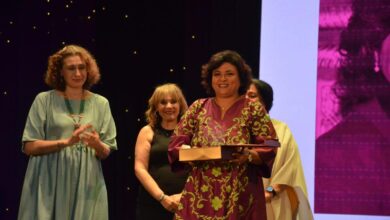This month, the first adaptation of Egyptian novelist Alaa al-Aswany's “Chicago” is showing at the Amandiers Theater in the Parisian suburb of Nanterre. Published in 2006, “Chicago” depicts the lives of Egyptian students at a university in the American city. It is a tale of exile and expatriates' frustration with their native country's government; this is precisely why French playwright and Amandiers Director Jean-Louis Martinelli chose to adapt it in Nanterre, where many members of the local community are North African immigrants dealing with the same sentiments of uprooting and exile.
According to Martinelli, theater should echo life, and Aswany’s novels emanate transcendent values of humanity, making their theatrical adaptation equally exciting and powerful. He first met Aswany two years ago in Cairo to ask for his permission to adapt "Chicago" into a play. After several working sessions, the script was ready, and Martinelli decided to call it “I Wish I Were Egyptian” after the revolution began in January.
In an interview with Al-Masry Al-Youm, Matrinelli discusses the project and expresses his wish to perform in Egypt.
Al-Masry Al-Youm: What gave you the idea to adapt “Chicago” into a play?
Jean-Louis Martinelli: After reading Aswany’s three novels ["The Yacoubian Building," "Chicago" and "I Wish I Were Egyptian"], I realized that these stories all resonate beyond a local Egyptian context, just like the works of Fyodor Dostoyevsky and Naguib Mahfouz. They are stories about humanity, ones that aptly mingle the intimate with the political in a very interesting way.
Al-Masry: So when did the project start?
Martinelli: I met Aswany for the first time two years ago in Cairo. I had initially planned to finish off this production in 2013, but my project at the time was much more ambitious. I wanted to work on a triptych of his three novels. After much reflection, I decided to work on the novel I felt most strongly about, “Chicago.” I could relate to it more, understand the tensions between East and West. I also thought that this would obviously interest and appeal to the local population of Nanterre. To me, “Chicago” is a great novel on the pain of exile, not only a novel that forecasted dramatic changes in Egypt.
Al-Masry: Did you feel a sense of urgency when the revolution broke out to have the adaptation ready earlier than planned?
Martinelli: Absolutely. Initially, the triptych project was supposed to be completed in 2013, but when the revolution started in late January, I realized that we had to do it straight away. I considered us very lucky, as the fiction material we were working on was both prophetic and embedded in reality. Aswany wrote years ago about the revolution boiling among a large portion of Egyptian society. The revolution is also the reason why I asked Aswany's permission to change the title of the adaptation to “I Wish I Were Egyptian” instead of “Chicago.” Although it can be a bit confusing as his collection of short stories “Friendly Fire” was recently translated into French and renamed “I Wish I Were Egyptian,” I found the name more informative. It was also quite jolly, I must say, to have posters advertising for the play in the Parisian metro, reading "I Wish I Were Egyptian."
Al-Masry: How freely did you adapt Aswany’s novel?
Martinelli: Aswany gave me absolute freedom to work on his text. I explained to him what the principles of adaptation were, and told him about the characters I did not think I would keep. But he made it very clear that a play is something utterly different and that the novel would not be tarnished by the adaptation. He actually attended one of the performances two weeks ago, and what we are all hoping for today is to be able to perform [the play] in local theaters in Cairo and Alexandria with Arabic subtitles. I’ll be back in Cairo in late October to discuss how feasible this is.
Al-Masry: How has the French audience received the play?
Martinelli: Extremely well so far. We have a few more days to go, and the reviews have been very good. People are absolutely enthusiastic.
Al-Masry: What are the particulars of this adaptation?
Martinelli: Well, we are trying to give the public the feeling of reading a novel, to place the audience in the position of the reader. So we also kept the lines that are not in the dialogue. So the actors constantly balance between the first and third person, to make people hear the text itself. I also decided to take out two couples that appear in Chicago: the very Americanized one and the traditional Egyptian one because I wanted to avoid this French debate over the veil.
Al-Masry: How do you see the role of theater in a neighborhood like Nanterre?
Martinelli: All the suburbs are cosmopolitan cities, so if we have the ambition to run a popular theater and talk to everyone, we have to choose plays that can resonate with this audience. In Nanterre, a large part of the population has North African origins, and the topic of exile developed by Aswany in his book is very appropriate. What is really important to me is to broadcast Aswany's very tolerant vision of Islam, because it is an important message for kids and teenagers to listen to in the suburbs in France to avoid extreme isolation.
“I Wish I Were Egyptian” is showing at Amandiers Theater in Nanterre from 16 September until 21 October.




